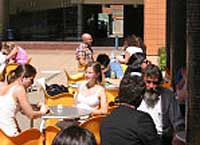| Food Science and Technology - FOODH13972 |
|
|||||||||||||||||||
|
Plan Summary
This plan is for a MAJOR in Food Science and Technology in an advanced Science program.
Food Science and Technology involves the understanding of basic sciences and the application of this knowledge to foods, from the point of production, through handling, processing, preservation, distribution and marketing, up to consumption and utilisation by consumers. It is concerned with food processes, food commodities, food composition and food quality (including sensory properties, safety and nutritional value). The study of Food Science and Technology integrates many scientific disciplines. Its bases are in chemistry, physics, biochemistry and microbiology. Its borders merge with those of agriculture, engineering, human nutrition, public health, commerce, psychology and law. Biotechnology has a role of increasing importance in food science and technology. The food scientist and food technologist are concerned with food supplies and requirements, community wants and needs, and equitable distribution of foods to ensure human nutritional needs are met. New knowledge is acquired in the laboratory, the pilot plant and the community, and then applied to the development of safe, nutritious and palatable foods, beverages and food ingredients by optimisation of processes and equipment. Foods are studied in terms of their basic constituents and structures and the changes they undergo when subjected to handling, processing and distribution. The food scientist and food technologist are equally concerned with the development and selection of raw materials from agricultural, horticultural, animal and marine sources. A safe, adequate, palatable and nutritious food supply is essential to human health. The food and beverage industry is of major economic importance and is the largest sector of manufacturing industry in Australia. Internationally, food production, processing and service are among the largest and most stable industries. The challenges are to increase the availability, variety, quality and quantity of foods economically and in line with the needs of the world population. Australian industry has a major role to play in supplying high quality foods to overseas markets and there is a national and international demand for professionally trained people prepared to accept responsibility for the quality and safety of food. These programs provide basic preparation for food science and technology careers in the food industry, the public sector, education, research, the food service industry, public health, management and marketing. Graduates may also find careers in health and environmental sciences, management of food resources and food wastes, and communication, and in areas such as dietetics after further training. Undergraduate training in the Food Science and Technology plan is administered through the Science Student Centre. The BSc program is three stages for a Pass degree during which students can study aspects of food science and technology in combination with other courses in a relevant discipline, preferably biochemistry, microbiology, biotechnology or chemistry. The fourth Honours Stage of the BSc program involves an extensive research project.
Stage 1
Note: Students without the assumed knowledge for these Chemistry courses may substitute CHEM1011 and CHEM1021.
or two alternative Mathematics courses (total 12 UOC Level I Mathematics):
one of
and one of
Plus
Stage 2
One course from:
One course from:
PLUS
Stage 3
Elective courses totalling 30 UOC. Recommended:
Stage 4 (Honours)
|
||||||||||||||||||||

| Contacts | Library | myUNSW | WebCT |
